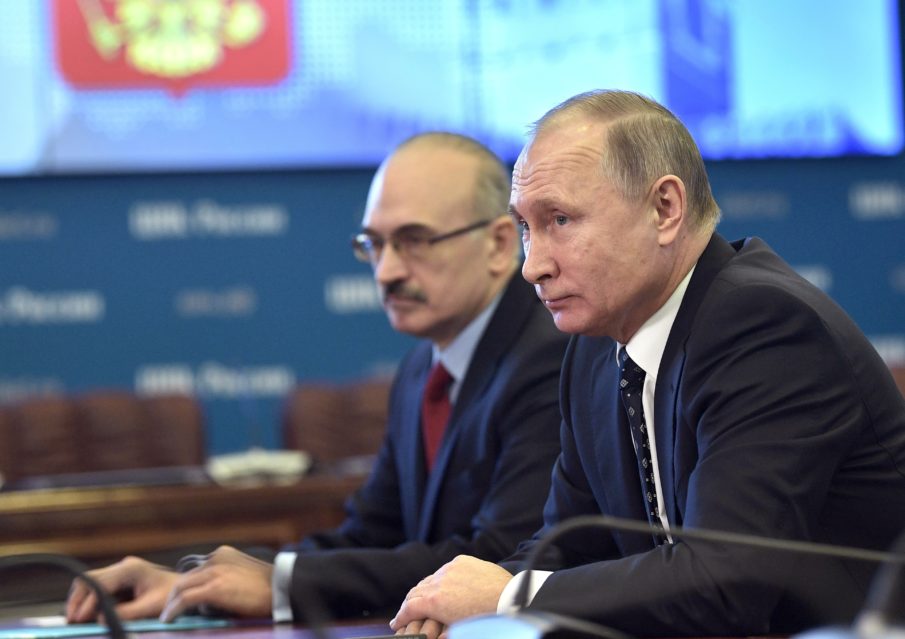Following months of heightening tensions between Kim Jong Un’s North Korean regime and a U.S.-led coalition of nations bent on seeing an end to his nuclear pursuits, the past few weeks have seen a slight downturn in aggressive rhetoric. With North and South Korea engaging in a dialogue aimed at permitting North Korean participation in the upcoming Winter Olympics being held in South Korea, and the United States agreeing to temporarily freeze military exercises near North Korean territory until the games are over, it would seem that now, more than ever, there may be a chance for a diplomatic resolution to a situation that once seemed destined for war.
And if you were to ask Russian President Vladimir Putin about it, he’d explain that it’s all because of the expert diplomacy employed by none other than North Korea’s despotic Supreme Leader, Kim Jong Un.
I think that Mr. Kim Jong Un has obviously won this round. He has completed his strategic task: he has a nuclear weapon, he has missiles of global reach, up to 13,000 km, which can reach almost any point of the globe,” Putin said. “He is already a shrewd and mature politician.”
There is, of course, some truth to Putin’s perspective on North Korea’s position as they make tentative moves toward diplomatic discourse with their neighbor to the south. With November’s launch of Kim’s latest and most powerful intercontinental ballistic missile platform to date, the Hwasong-15, it is now an undeniable fact that North Korea possesses the firepower to reach targets as far away as Washington D.C., and following September’s successful detonation of the country’s first dual stage (hydrogen) bomb, that missile can certainly pack a significant punch.
Despite there still being some questions regarding the survivability of North Korea’s warhead reentry vehicles, it would seem that Kim’s regime has indeed succeeded at what he set out to do: become a nuclear power with the leverage to threaten strikes anywhere in the world. The only thing left to do, then, is hang onto those nukes.
The United States has said repeatedly that it will not tolerate a nuclear North Korea, and the most recent round of sanctions levied by the United Nations do promise to make further development of Kim’s nuclear arsenal a struggle, but after the success Kim has already achieved, he could feasibly halt further testing and still tout his nuclear capabilities on a world stage. His reentry vehicle doesn’t have to work, to threaten other nations; they just have to think that it might. After all, his goal all along was not to start a nuclear war, but rather to renegotiate North Korea’s relationship with the world from a position of power… nuclear power.
North Korea has been clear that they do not intend to include their nuclear arms in ongoing discussions with South Korea, but the fact that the two nations are engaging in any form of discourse at all is a significant step away from war on the Korean peninsula, regardless of how hard a line President Trump may choose to draw regarding North Korea’s nuclear arsenal. James Mattis, American Secretary of Defense, told reporters recently that South Korea and the United States are on the same page regarding how to move forward with North Korea, but as tensions simmer, it is possible that South Korea may be willing to relent to the idea of Kim keeping the nukes he’s already got, provided they halt any further testing and development.
If that does happen, the United States would find themselves in a difficult position: demanding a condition for peace that their own ally, the nation with the most to lose in a direct conflict with North Korea, does not.
Image courtesy of the Associated Press
Already have an account? Sign In
Two ways to continue to read this article.
Subscribe
$1.99
every 4 weeks
- Unlimited access to all articles
- Support independent journalism
- Ad-free reading experience
Subscribe Now
Recurring Monthly. Cancel Anytime.











COMMENTS